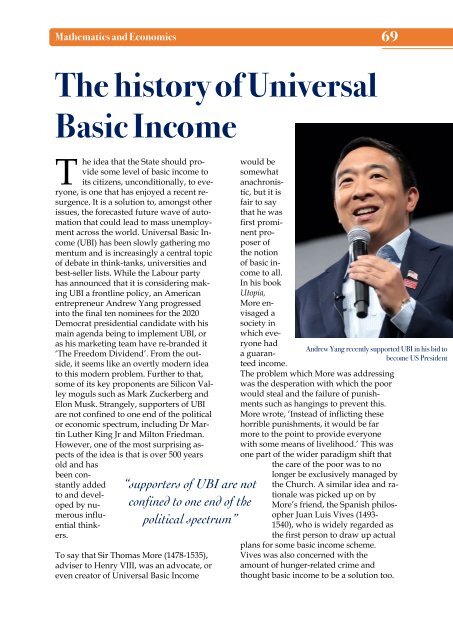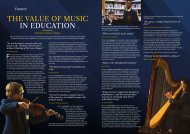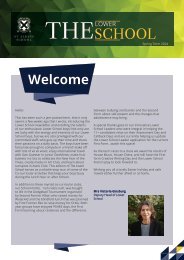Create successful ePaper yourself
Turn your PDF publications into a flip-book with our unique Google optimized e-Paper software.
Mathematics and Economics<br />
69<br />
<strong>The</strong> history of Universal<br />
Basic Income<br />
T<br />
he idea that the State should provide<br />
some level of basic income to<br />
its citizens, unconditionally, to everyone,<br />
is one that has enjoyed a recent resurgence.<br />
It is a solution to, amongst other<br />
issues, the forecasted future wave of automation<br />
that could lead to mass unemployment<br />
across the world. Universal Basic Income<br />
(UBI) has been slowly gathering mo<br />
mentum and is increasingly a central topic<br />
of debate in think-tanks, universities and<br />
best-seller lists. While the Labour party<br />
has announced that it is considering making<br />
UBI a frontline policy, an American<br />
entrepreneur Andrew Yang progressed<br />
into the final ten nominees for the <strong>2020</strong><br />
Democrat presidential candidate with his<br />
main agenda being to implement UBI, or<br />
as his marketing team have re-branded it<br />
‘<strong>The</strong> Freedom Dividend’. From the outside,<br />
it seems like an overtly modern idea<br />
to this modern problem. Further to that,<br />
some of its key proponents are Silicon Valley<br />
moguls such as Mark Zuckerberg and<br />
Elon Musk. Strangely, supporters of UBI<br />
are not confined to one end of the political<br />
or economic spectrum, including Dr Martin<br />
Luther King Jr and Milton Friedman.<br />
However, one of the most surprising aspects<br />
of the idea is that is over 500 years<br />
old and has<br />
been constantly<br />
added<br />
to and developed<br />
by numerous<br />
influential<br />
thinkers.<br />
“supporters of UBI are not<br />
confined to one end of the<br />
political spectrum”<br />
To say that Sir Thomas More (1478-1535),<br />
adviser to Henry VIII, was an advocate, or<br />
even creator of Universal Basic Income<br />
would be<br />
somewhat<br />
anachronistic,<br />
but it is<br />
fair to say<br />
that he was<br />
first prominent<br />
proposer<br />
of<br />
the notion<br />
of basic income<br />
to all.<br />
In his book<br />
Utopia,<br />
More envisaged<br />
a<br />
society in<br />
which everyone<br />
had<br />
a guaranteed<br />
income.<br />
<strong>The</strong> problem which More was addressing<br />
was the desperation with which the poor<br />
would steal and the failure of punishments<br />
such as hangings to prevent this.<br />
More wrote, ‘Instead of inflicting these<br />
horrible punishments, it would be far<br />
more to the point to provide everyone<br />
with some means of livelihood.’ This was<br />
one part of the wider paradigm shift that<br />
the care of the poor was to no<br />
longer be exclusively managed by<br />
Andrew Yang recently supported UBI in his bid to<br />
become US President<br />
the Church. A similar idea and rationale<br />
was picked up on by<br />
More’s friend, the Spanish philosopher<br />
Juan Luis Vives (1493-<br />
1540), who is widely regarded as<br />
the first person to draw up actual<br />
plans for some basic income scheme.<br />
Vives was also concerned with the<br />
amount of hunger-related crime and<br />
thought basic income to be a solution too.


















